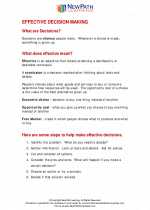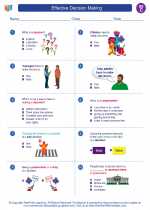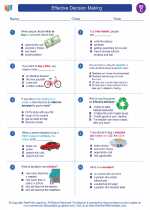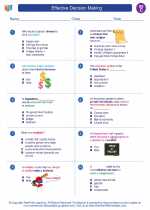Effective Decision Making
Decisions are choices people make. Whenever a choice is made, something i given up. Read More...
◂Social Studies Worksheets and Study Guides Third Grade. Effective Decision Making
Study Guide Effective Decision Making
Effective Decision Making  Worksheet/Answer key
Worksheet/Answer key Effective Decision Making
Effective Decision Making  Worksheet/Answer key
Worksheet/Answer key Effective Decision Making
Effective Decision Making  Worksheet/Answer key
Worksheet/Answer key Effective Decision Making
Effective Decision Making 

 Worksheet/Answer key
Worksheet/Answer key
 Worksheet/Answer key
Worksheet/Answer key
 Worksheet/Answer key
Worksheet/Answer key

The resources above cover the following skills:
National Curriculum Standards for Social Studies (NCSS)
INDIVIDUAL DEVELOPMENT AND IDENTITY
SOCIAL STUDIES PROGRAMS SHOULD INCLUDE EXPERIENCES THAT PROVIDE FOR THE STUDY OF INDIVIDUAL DEVELOPMENT AND IDENTITY.
KNOWLEDGE - Learners will understand:
Individual choices are influenced by personal and social factors.
POWER, AUTHORITY, AND GOVERNANCE
SOCIAL STUDIES PROGRAMS SHOULD INCLUDE EXPERIENCES THAT PROVIDE FOR THE STUDY OF HOW PEOPLE CREATE, INTERACT WITH, AND CHANGE STRUCTURES OF POWER, AUTHORITY, AND GOVERNANCE.
PRODUCTS - Learners demonstrate understanding by:
Preparing and presenting descriptions of and possible solutions to school or community problems that would require working with those in positions of authority.
Preparing and implementing an action plan addressing a local public issue or problem.
PRODUCTION, DISTRIBUTION, AND CONSUMPTION
SOCIAL STUDIES PROGRAMS SHOULD INCLUDE EXPERIENCES THAT PROVIDE FOR THE STUDY OF HOW PEOPLE ORGANIZE FOR THE PRODUCTION, DISTRIBUTION, AND CONSUMPTION OF GOODS AND SERVICES.
KNOWLEDGE - Learners will understand:
The difference between needs and wants.
What people and communities gain and give up when they make a decision.
The characteristics of a market economy.
PROCESSES - Learners will be able to:
Analyze the differences between wants and needs.
Evaluate how the decisions that people make are influenced by the trade-offs of different options.
GLOBAL CONNECTIONS
SOCIAL STUDIES PROGRAMS SHOULD INCLUDE EXPERIENCES THAT PROVIDE FOR THE STUDY OF GLOBAL CONNECTIONS AND INTERDEPENDENCE.
KNOWLEDGE - Learners will understand:
All cultures have similar needs, but meet those needs in different ways that may influence or be influenced by global connections.
PROCESSES - Learners will be able to:
Identify and examine how wants and needs of people in one part of the world may conflict with the wants and needs of people in other parts of the world.
CIVIC IDEALS AND PRACTICES
SOCIAL STUDIES PROGRAMS SHOULD INCLUDE EXPERIENCES THAT PROVIDE FOR THE STUDY OF THE IDEALS, PRINCIPLES, AND PRACTICES OF CITIZENSHIP IN A DEMOCRATIC REPUBLIC.
KNOWLEDGE - Learners will understand:
Key practices in a democratic society include civic participation based on studying community issues, planning, decision-making, voting, and cooperating to promote civic ideals.
PROCESSES - Learners will be able to:
Ask and find answers to questions about how to plan for action with others to improve life in the school, community, and beyond.
Analyze how specific policies or citizen behaviors reflect ideals and practices consistent or inconsistent with democratic ideals.
PRODUCTS - Learners demonstrate understanding by:
Developing a plan in collaboration with others to carry out a school improvement project.
National Standards for Civics and Government (NSCG)
What is Government and What Should It Do? Why is it important to limit the power of government?
Importance of limited government: Students should be able to explain why limiting the power of government is important to their own lives. To achieve this standard, students should be able to
Explain why limited government is important for the protection of individual rights such as
Political rights to vote
What are the Basic Values and Principles of American Democracy? What are the most important values and principles of American democracy?
Fundamental values and principles: Students should be able to explain the importance of the fundamental values and principles of American democracy. To achieve this standard, students should be able to
Explain the importance for themselves, their school, their community, and their nation of each of the following fundamental principles of American democracy:
People exercise their authority directly by voting for or against certain rules, laws, or candidates as well as by voting in community or town meetings
Identify fundamental values and principles as they are expressed in the Declaration of Independence, Preamble to the United States Constitution, the Bill of Rights, Pledge of Allegiance, speeches, songs, and stories
What are the Basic Values and Principles of American Democracy? What are some important beliefs Americans have about themselves and their government?
Distinctive characteristics of American society: Students should be able to identify some important beliefs commonly held by Americans about themselves and their government. To achieve this standard, students should be able to describe the following beliefs commonly held by Americans:
Importance of the individual: Students should be able to explain that Americans believe
The vote of one individual should count as much as another’s
Importance of their school, community, state, and nation: Students should be able to explain that Americans believe that
Everyone should be concerned about the well-being of his/her school, community, state, and nation
People should try to improve the quality of life in their schools, communities, states, and nation
People should help others who are less fortunate than they and assist them in times of need, emergency, or natural disaster
Importance of equality of opportunity and equal protection of the law: Students should be able to explain that Americans believe that
All people have a right to participate in political life by expressing their opinions and trying to persuade others; all citizens over 18 years of age have the right to vote; and citizens who meet age and other qualifications have the right to seek public office
Importance of voluntarism: Students should be able to explain that Americans believe that
People should volunteer to help others in their family, schools, communities, state, nation, and the world
Volunteering is a source of individual satisfaction and fulfillment
What are the Basic Values and Principles of American Democracy? Why is it important for Americans to share certain values, principles, and beliefs?
American identity: Students should be able to explain the importance of Americans sharing and supporting certain values, principles, and beliefs. To achieve this standard, students should be able to
Identify basic documents that set forth shared values, principles, and beliefs, e.g., Declaration of Independence, United States Constitution and Bill of Rights, Pledge of Allegiance
What are the Basic Values and Principles of American Democracy? How can people work together to promote the values and principles of American democracy?
Promoting ideals: Students should be able to identify ways people can work together to promote the values and principles of American democracy. To achieve this standard, students should be able to
Explain how they can promote the values and principles of American democracy by
Helping to promote the common good, e.g., volunteering for school and community service, cleaning up the environment
Participating in government, e.g., voting, becoming informed about public issues, attempting to change laws by writing to legislators, serving on juries
How Does the Government Established by the Constitution Embody the Purposes, Values, and Principles of American Democracy? What does the national government do and how does it protect individual rights and promote the common good?
Organization and major responsibilities of the national government: Students should be able to give examples of ways the national government protects individual rights and promotes the common good. To achieve this standard, students should be able to explain that
The judicial branch, headed by the Supreme Court, makes decisions concerning the law that are intended to
Protect individual rights, e.g., the right to a fair trial, to vote, to practice one’s religious beliefs
How Does the Government Established by the Constitution Embody the Purposes, Values, and Principles of American Democracy? What are the major responsibilities of state governments?
Organization and major responsibilities of state governments: Students should be able to explain the most important responsibilities of their state government. To achieve this standard, students should be able to
Explain how people can participate in their state government, e.g., being informed and taking part in discussions of state issues, voting, volunteering their services, holding public office, serving on governing committees and commissions
How Does the Government Established by the Constitution Embody the Purposes, Values, and Principles of American Democracy? What are the major responsibilities of local governments?
Organization and major responsibilities of local governments: Students should be able to explain the most important responsibilities of their local government. To achieve this standard, students should be able to
Explain how people can participate in their local government, e.g., being informed and taking part in discussions of local issues, voting, volunteering their services, holding public office, serving on governing committees and commissions
Explain why it is important that people participate in their local government, e.g., to protect their rights and promote the common good, improve the quality of life in their community, to gain personal satisfaction, to prevent officials from abusing their power
What are the Roles of the Citizen in American Democracy? What does it mean to be a citizen of the United States?
The meaning of citizenship: Students should be able to explain the meaning of citizenship in the United States. To achieve this standard, students should be able to
Explain the important characteristics of citizenship in the United States. Specifically, citizenship
Means each person has certain responsibilities, e.g., respecting the law, voting, paying taxes, serving on juries
What are the Roles of the Citizen in American Democracy? What are important responsibilities of Americans?
Responsibilities of individuals: Students should be able to explain why certain responsibilities are important to themselves and their family, community, state, and nation. To achieve this standard, students should be able to identify such responsibilities as the following and explain their importance:
Civic responsibilities, e.g., obeying the law, respecting the rights of others, being informed and attentive to the needs of their community, paying attention to how well their elected leaders are doing their jobs, communicating with their representatives in their school, local, state, and national governments, voting, paying taxes, serving on juries, serving in the armed forces
What are the Roles of the Citizen in American Democracy? What dispositions or traits of character are important to the preservation and improvement of American democracy?
Dispositions that enhance citizen effectiveness and promote the healthy functioning of American democracy: Students should be able to explain the importance of certain dispositions to themselves and American democracy. To achieve this standard, students should be able to
Explain the importance of the following dispositions
Persistence—willingness to attempt again and again to accomplish a worthwhile goal
Compassion—concern for the well-being of others, especially for the less fortunate
What are the Roles of the Citizen in American Democracy? How can Americans participate in their government?
Forms of participation: Students should be able to describe the means by which citizens can influence the decisions and actions of their government. To achieve this standard, students should be able to
Identify ways people can monitor and influence the decisions and actions of their government
Voting
National Content Standards in Economics (NCSE)
Scarcity
Students will understand that productive resources are limited. Therefore, people cannot have all the goods and services they want; as a result, they must choose some things and give up others. Students will be able to use this knowledge to identify what they gain and what they give up when they make choices.
At the completion of Grade 4, students will know that:
People make choices because they can’t have everything they want.
Economic wants are desires that can be satisfied by consuming a good (an object), a service (an action), or a leisure activity.
People’s choices about what goods and services to buy and consume determine how resources will be used.
Whenever a choice is made, something is given up because resources are limited.
The opportunity cost of an activity is the value of the best alternative that would have been chosen instead. It includes what would have been done with the money spent and the time and other resources used in undertaking the activity.
At the completion of Grade 4, students will use this knowledge to:
Identify some choices they have made and explain why they had to make a choice.
Match a list of wants with the correct example of a good, service or leisure activity that satisfies each want.
Describe a situation that requires a choice, make a decision, and identify the opportunity cost.
National Center for History in Schools (NCHS)
Historical Thinking Standards
Historical Analysis and Interpretation
Compare and contrast differing sets of ideas, values, personalities, behaviors, and institutions.
Compare different stories about a historical figure, era, or event.